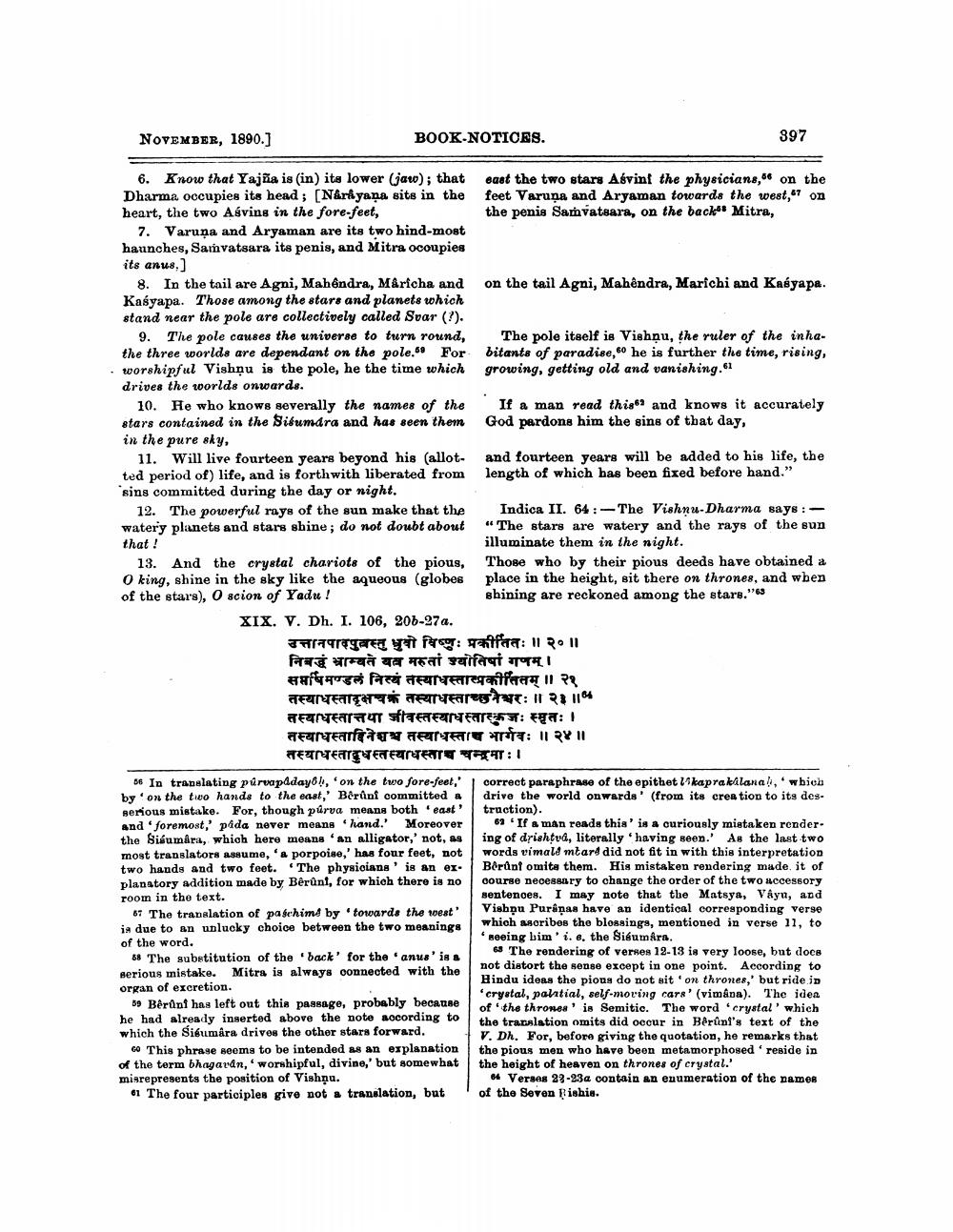________________
NOVEMBER, 1890.]
BOOK-NOTICES.
397
6. Know that Yajña is (in) its lower jaro); that east the two stars Asvin the physicians," on the Dharma occupies its head; (NAriyaņa sits in the feet Varuna and Aryaman towards the west, 47 on heart, the two Asvins in the fore-feet,
the penis Samvatsara, on the back Mitra, 7. Varuna and Aryaman are its two hind-most haunches, Samvatsara its penis, and Mitra ocoupies its anus,]
8. In the tail are Agni, Mahendra, Mårfcha and on the tail Agni, Mahendra, Marichi and Kasyapa. Kasyapa. Those among the stars and planets which stand near the pole are collectively called Svar (?).
9. The pole causes the universe to turn round, The pole itself is Vishnu, the ruler of the inhathe three worlds are dependant on the pole. Forbitants of paradise, he is further the time, rising, worshipful Vishộu is the pole, he the time which growing, getting old and vanishing.61 drives the worlds onwards.
10. He who knows severally the names of the If a man read this69 and knows it accurately stars contained in the Situmdra and has seen them God pardons him the sins of that day, in the pure sky,
11. Will live fourteen years beyond his allot- and fourteen years will be added to his life, the ted period of) life, and is forthwith liberated from length of which has been fixed before hand." sins committed during the day or night.
12. The powerful rays of the sun make that the Indica II. 64:- The Vishnu-Dharma says : - watery planets and stars shine; do not doubt about "The stars are watery and the rays of the sun that!
illuminate them in the night. 13. And the crystal chariots of the pious, Those who by their pious deeds have obtained a O king, shine in the sky like the aqueous (globes place in the height, sit there on thrones, and when of the stars), Oscion of Yadu!
shining are reckoned among the stars."63 XIX. V. Dh. I. 106, 206-27a.
Targaret : antet: 11 R 11 निबर्छ भ्राम्बते बब मरुतां ज्योतिषां गणम् । समषिमण्डल नित्वं तस्याधस्तापकीतितम् ।। २१ तस्याधस्तादृक्षचक्रं तस्याधस्ताच्छनेश्वरः ॥२३॥ तस्वाधस्तात्तथा जीवस्तस्याधस्ताकजः स्मृतः। तस्याधस्तादिनेशश्च तस्याधस्ताच भार्गवः ॥२४॥ तस्याधस्तादुधस्तस्वाधस्ताच चन्द्रमा:।
ng purvapadayoh, on the two fore-feet,' by 'on the two hands to the east,' Berunf committed a serious mistake. For, though purva means both east' and foremost,' pada never means "hand. Moreover the Sibumára, which here means 'an alligator,' not, as most translators assume, 'a porpoise,' has four feet, not two hands and two feet. The physicians' is an er planatory addition made by Bêrunt, for which there is no room in the text.
67 The translation of pagchim by towards the rest is due to an unlucky choice between the two meanings of the word.
88 The substitution of the back' for the anus' is a serious mistake. Mitra is always connected with the organ of excretion.
59 Bêrunt has left out this passage, probably because he had already inserted above the noto according to which the Sibumåra drives the other stars forward.
Go This phrase seems to be intended as an explanation of the term bhagavan, 'worshipful, divine,' but somewhat misrepresents the position of Vishnu.
01 The four participles give not a translation, but
correct paraphrase of the epithet likaprakilanal, which drive the world onwards' (from its creation to its des. truction).
61 If a man reads this' is a curiously mistaken rendering of drishtva, literally having seen. As the last two words vimala mtard did not fit in with this interpretation Bérunt omita them. His mistaken rendering made it of course necessary to change the order of the two accessory sentences. I may note that the Matsya, Vaya, and Vishnu Puranas have an identical corresponding verse which ascribes the blossings, mentioned in verse 11, to seeing bim'i.e. the Sibumára.
68 The rendering of verses 12-13 is very loose, but doce not distort the sense except in one point. According to Hindu ideas the pions do not sit 'on thrones,' but ride in 'crystal, pantial, self-moving care' (vimapa). The idea of the thrones' is Semitic. The word 'crystal' which the translation omits did occur in Beruni's text of the V. Dh. For, before giving the quotation, he remarks that the pious men who have been metamorphosed ' reside in the height of heaven on thrones of crystal.'
4 Verses 23-23a contain an enumeration of the names of the Seven Rishia.




